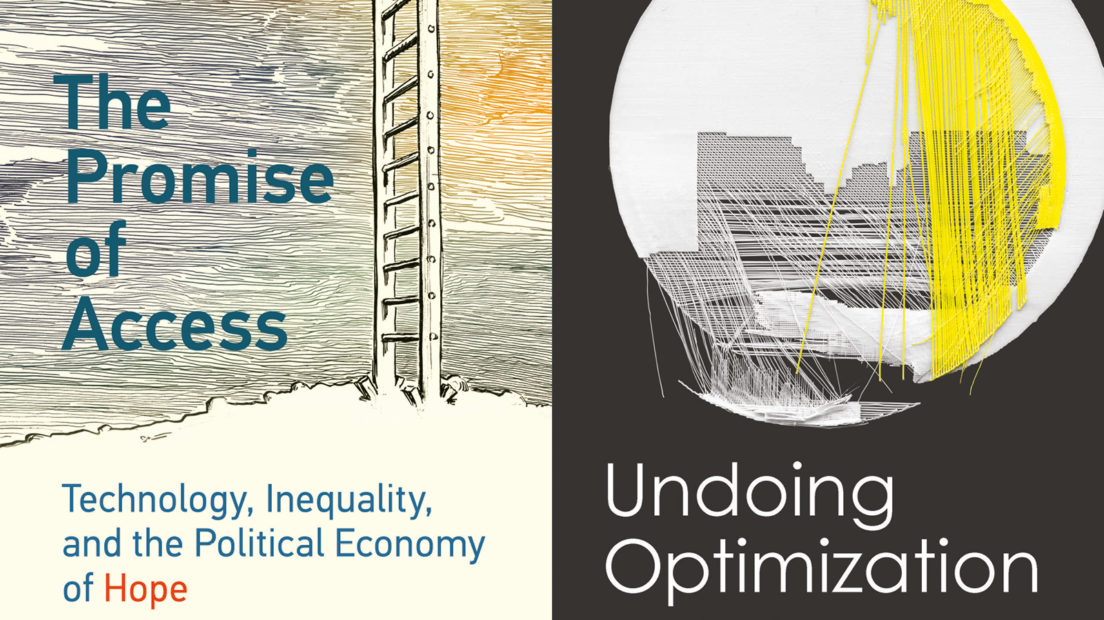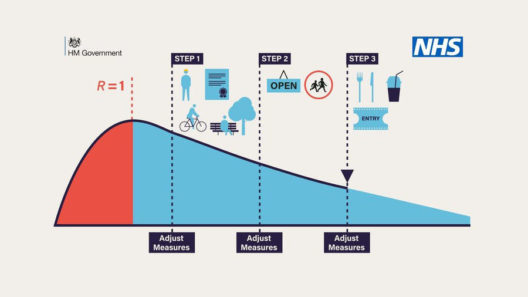Technology and civic engagement – double book launch with the Ada Lovelace Institute
Dr Alison Powell and Dr Daniel Greene in conversation to discuss their new books

The summary of this session was written by Imogen Fairbairn, Research Assistant with the JUST AI network.
Dr Alison Powell (LSE), Director of the JUST AI network and author of Undoing Optimization: Civic Action in Smart Cities (2021, Yale UP), and Dr Daniel Greene (University of Maryland), author of The Promise of Access: Technology, Inequality, and the Political Economy of Hope (2021, MIT Press), discuss their new books, which span topics including the ongoing dynamics of technological citizenship, civic action, tech-driven solutions, local regulations and the politics of communication and data technologies.
The conversation is chaired by Dr Dylan Mulvin (LSE) with an introduction from Octavia Reeve (Ada Lovelace Institute).
Watch the event in full below:
This video is embedded with YouTube’s ‘privacy-enhanced mode’ enabled although it is still possible that if you play this video it may add cookies. Read our Privacy policy and Digital best practice for more on how we use digital tools and data.
Speakers
-
Dr Alison Powell
Director of the JUST AI network and Associate Professor in Media and Communications at the LSE -
Dr Daniel Greene
Assistant Professor of Information Studies at the University of Maryland
Chair
-
Dr Dylan Mulvin
Assistant Professor in the Department of Media and Communications at the LSE
Introduced by
-
Octavia Field Reid
Associate Director (Public Participation & Research Practice)
Summary
Alison Powell identifies three truisms that describe a context for technology-driven civic engagement.
The first is an understanding that technology-led optimisation, built on and within the conditions of social life, also shapes social life.
The second describes the processes in which optimisation takes shape: the ‘metaphors’ that frame and legitimise technological development as a core sociotechnical goal. Take, for instance, Greene’s concept of ‘bootstrapping’, which is used to define the relationship between technology and public institutions – the frantic process of experimentation in the name of a kind of access, a concept described by Greene in his Access Doctrine.
This version of access relies on a political common sense that deems society’s problems curable through technological development and new skills training. Access, as a metaphor, promises societal inclusion and growth.
Back to bootstrapping, which relies on these metaphors of network access, participation and optimisation – we can see this taking shape in library coding programmes or enormous renovation and construction projects, such as the new Obama Presidential Library.
Focusing on metaphor-led processes of development guides us to the third thread of Powell’s work: an understanding of another way of thinking through and about smart cities enabled by re-imagining the capacities of sociotechnical relationships.
Within this framework, the varied meanings and interpretations of access become visibly central to models of civic engagement and participation. Greene discusses access to and within public spaces, while Powell focuses on access within the smart city.
Mission ambiguity, network importance and optimisation are common themes of Greene and Powell’s understanding of access. All are interlinked, as we see when we consider them one by one:
- Mission ambiguity in the name of access allows for the goal of access to drift away from a people-led approach. Greene uses the example of American institutions to demonstrate that as the welfare state diminishes, many institutions are under-resourced resulting in unclear solutions and direction. Cash injections linked to privately funded renovation, skills workshops and training programs often result in a kind of bootstrapping within civic spaces that are led directly by corporate goals. Within public-private institutional partnerships, mission ambiguity around access allows for a centring of scale and optimisation that often foregoes the original needs of the individual. These partnerships favour some narratives of access over others, for instance increasing institutional access for the networked citizen, while potentially foregoing previous entry points for those that don’t fit an ideal demographic of participation.
- Access to networks in the smart city depends on framing network technology as potentially optimising civic engagement through better access of citizens to each other and to the government. Building on Manuel Castell’s theory of network power, Powell discusses the rise of ‘networked citizenship’, a ‘me-thos’ alongside an increased interest and awareness of how technology can connect citizens and develop networks. A perceived equating of network access with good citizenship is one metaphor that was discussed and critiqued throughout Powell and Greene’s conversation.
- An accepted (and limited) understanding of access also drives the ongoing optimisation of civic action, for instance through processes such as bootstrapping. Both Greene and Powell discuss the perceived inevitability of technological advancement and thus optimisation that drives citizen relationships. Powell makes visible a connection between the backdrop of networked citizenship with technology framed citizenship that pushes for an optimisation of daily urban life.
What are the ways that we can move through metaphors and beyond mission ambiguity to shift our thinking towards a people-focused approach to civic engagement?
Both Powell and Greene introduce potential ways forward. Greene points to the success of teachers unions (which have also gained momentum during COVID-19 school closures) noting that these organising models provide roads to recovery from within, which also expand an understanding beyond neoliberal competition. Powell introduces ‘The Commons’, a conceptual approach to the smart city that describes a ‘kind of sensed information that can help people to gain voice, speak back and use technology for their own purposes.’ We can see this materialise in Berlin and Athens, where activists have created their own intranets to develop networks that exist outside of centralised civic points of access.
In Berlin in the early 2000s, for example, the Freifunk mesh networking project modelled connections between different citizens who learned how to build wireless internet technology to connect their apartment buildings together. These connections also created an alternative means to access the internet at a time when ISPs struggled to provide service to neighbourhoods previously separated by the Berlin Wall.
In Athens at around the same time, a similar mesh networking project (Athens Wireless) created an information network almost entirely alternative to the internet, allowing the members to host and distribute alternative forms of media, including apps, file sharing and chat. These were all largely pirate-software led or inspired, and despite being short-lived, the Athens network created subversive and engaging re-imaginings of corporate media.
These citizen-led experiments model alternative forms of media and information creation and distribution without assuming a commercial model or a principle of optimisation.
There is, of course, a mission ambiguity to the commons that could be (and has been) used within a normative understanding of access and civic engagement, however there is also a feeling of opportunity to disrupt and decentralise these narratives too. It’s within this opportunity that Greene and Powell critique current understanding of access, institutions and citizenship to introduce new forms of people-led civic participation.
About the JUST AI Network
The programme JUST AI (Joining Up Society and Technology in AI) is an independent network of researchers and practitioners, led by Dr. Alison Powell (LSE), and supported by the UK’s Arts and Humanities Research Council (AHRC) and the Ada Lovelace Institute. The humanities-led network is committed to understanding the social and ethical value of data-driven technologies, artificial intelligence, and automated systems. The network builds on research in AI ethics, orienting it around practical issues concerning social justice, distribution, governance and design, and seeks thereby to inform the development of policy and practice.
Related content

To be seen we must be measured: data visualisation and inequality
How data, bodies and experience entwine.

Access as a responsible technology?
An exploration of ‘access’ as a way to rethink the meaning and potential of responsible technology, with Sara Hendren and Sarah Drinkwater

Prototyping AI ethics futures: Data walk with Dr Alison Powell
Part of a week-long series of events highlighting the new possibilities of a humanities-led, broadly engaging approach to data and AI ethics

Prototyping AI ethics futures: Data, AI and environment
Part of a week-long series of events highlighting the new possibilities of a humanities-led, broadly engaging approach to data and AI ethics